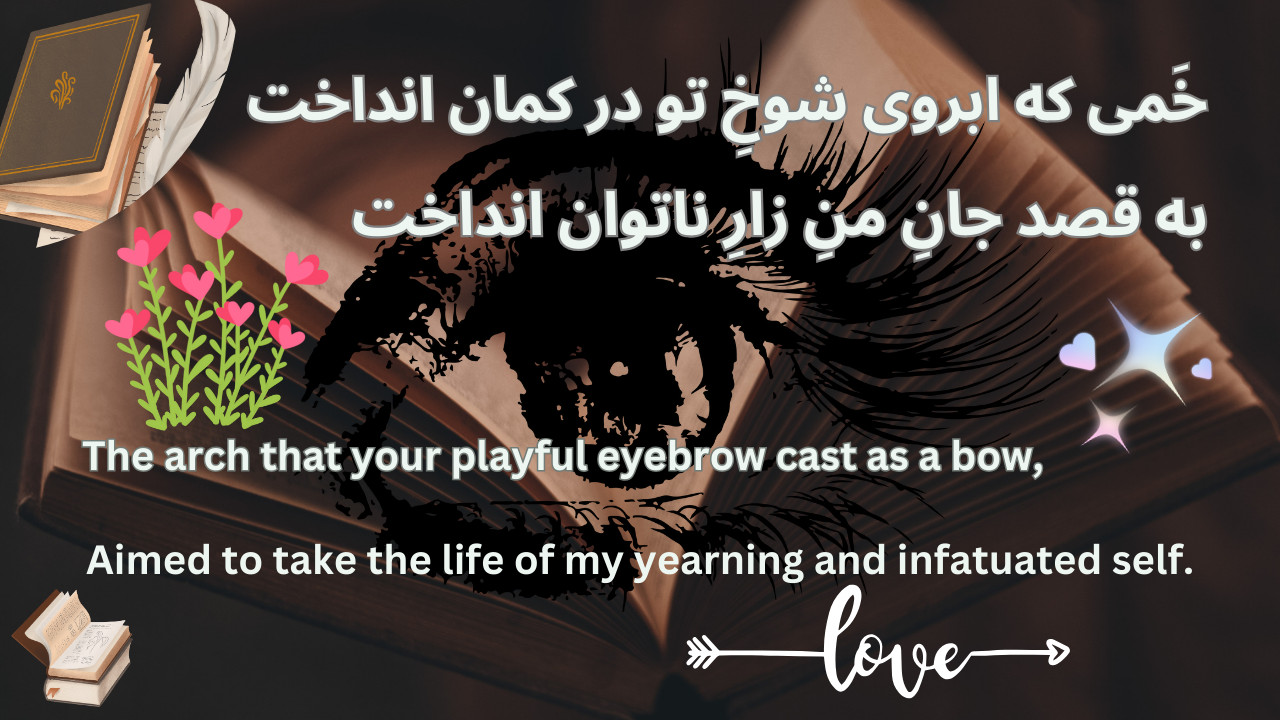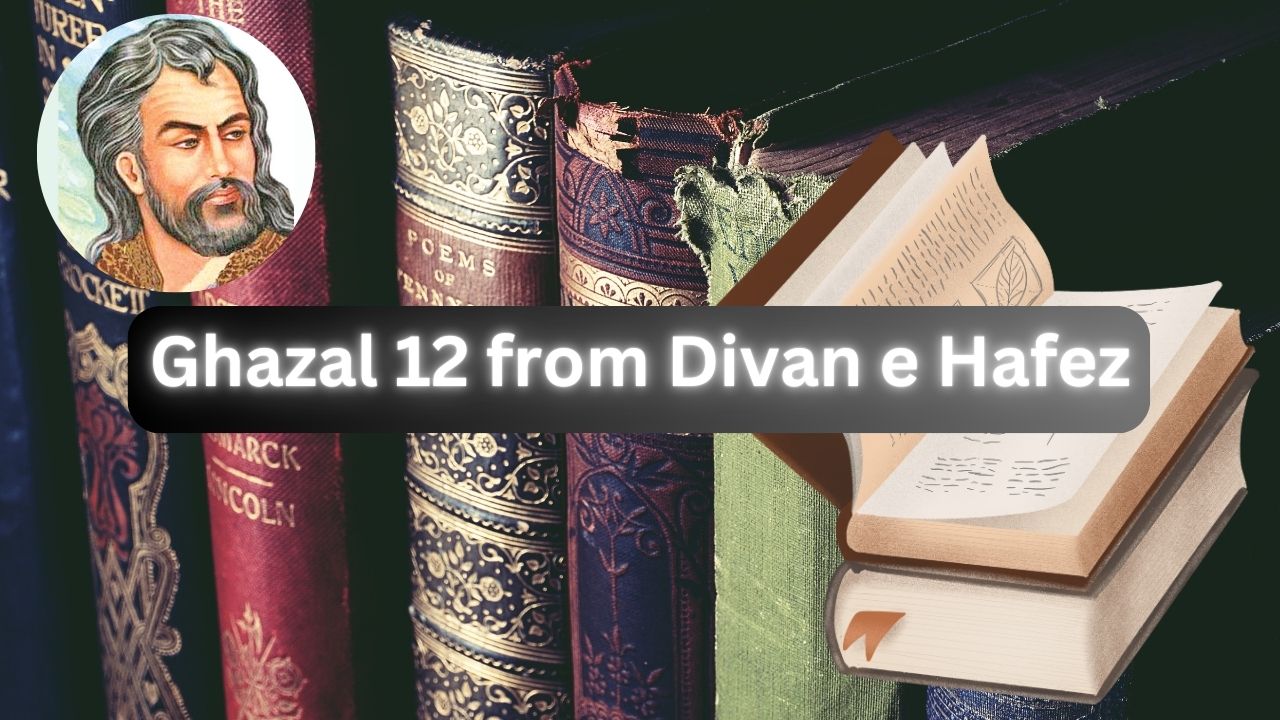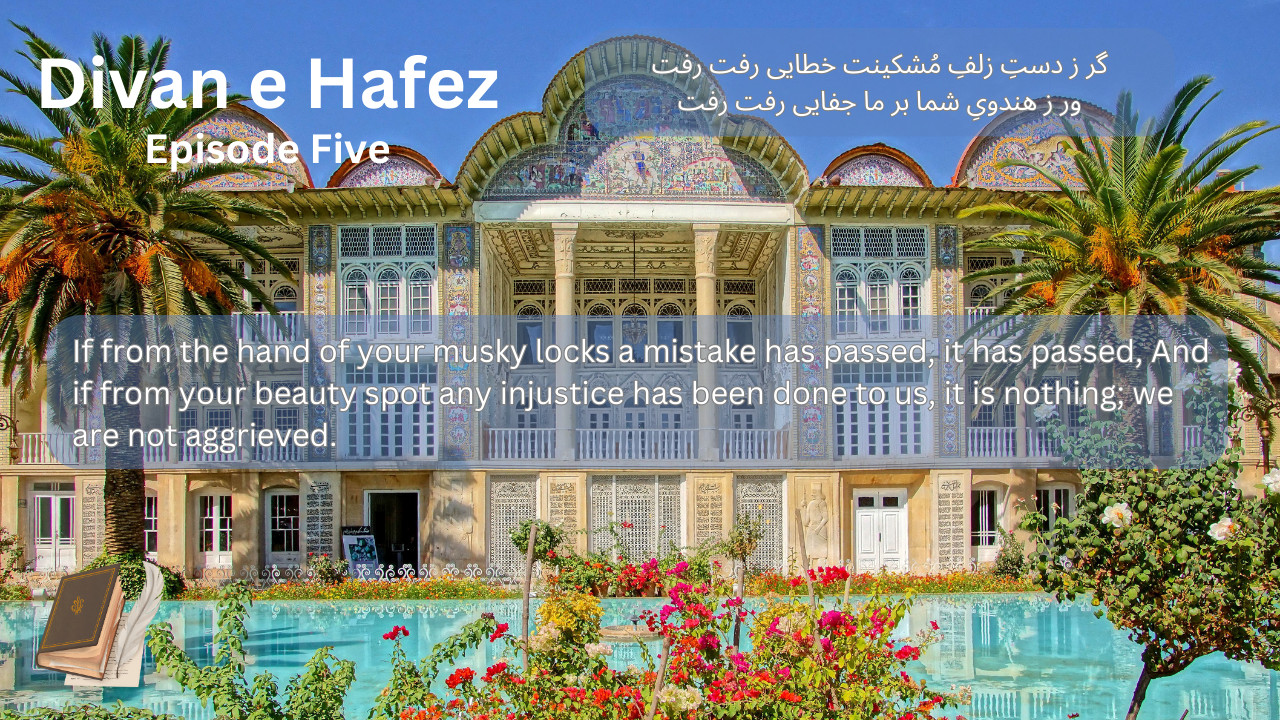In this post we discuss Ghazal number 16 when Hazrat e Hafez says:
خَمی که ابروی شوخِ تو در کمان انداخت
به قصد جانِ منِ زارِ ناتوان انداخت
تیر مژگانی که در کمان ابروی فریبا و دلربا و افسونگرت قرار گرفت و پرتاب شد به سمت قلبِ منِ عاشقِ ضعیفِ نحیف نشانه رفته بود. منظور آنکه اولین نگاه و توجه معشوق زیبا و فریبا که به با حرکات چشم و ابرو همراه است (و شاعر کشیده شدن ابروی معشوق را به زه شدن کمان تشبیه می کند)، برای عاشقی و سودایی من کافی بود
The arch that your playful eyebrow cast as a bow,
Aimed to take the life of my yearning and infatuated self.
The arrow of glances that rested in the bow of your enchanting, heart-stealing, and bewitching eyebrow was launched towards my heart, a frail and feeble lover, marked for demise.
It means that the first look and attention of the beautiful and seductive beloved, accompanied by the movements of the eyes and eyebrows (which the poet likens the drawing of the beloved’s eyebrow to the stringing of a bow), was enough for my yearning and infatuated self.
نبود نقش دو عالم، که رنگ الفت بود
زمانه طرح محبت، نه این زمان انداخت
قبل از آن که جهانی خلق شده باشد، رسم و آیین انس و دوستی بوده است. آفرینشِ شالوده و بنیانِ عشق و محبّت، قبل از آفرینش اجسام و اجرام بوده است. محتوای این بیت ازلیت و تقدم آفرینش عشق نسبت به خلق جهان و اجسام و اجرام است
Before the world was ever formed,
love was preceded in creation.
Before the world was ever formed, the custom and tradition of intimacy and love existed. The creation of the foundation and cornerstone of love and affection preceded the creation of bodies and celestial objects. The content of this verse speaks to the eternity and precedence of the creation of love over the creation of the world and all physical entities.
به یک کرشمه که نرگس به خودفروشی کرد
فریبِ چشمِ تو صد فتنه در جهان انداخت
در مقابل یک ناز و غمزه گل نرگس که برای خودنمایی و خودستایی کرد، عشوه و مکر و خدعه چشمان تو صدگونه شور و غوغا در جهان به پا کرد. منظور آنکه معشوق می گوید ناز و کرشمه فقط برای من است و بس
In response to one coquetry, that narcissus tried to allure,
Your eye’s deceit spun a hundred plots of sort.
In response to the coquetry and flirtation of the narcissus flower, which acted in self-display and vanity, the allure and deceit of your eyes stirred a hundred kinds of commotion and uproar in the world. It signifies that the beloved declares that such allure and flirtation are meant solely for her and no one else.
شراب خورده و خِوی کرده میروی به چمن
که آبِ روی تو آتش در ارغوان انداخت
وقتی مست کرده ای و صورتت عرق کرده است و به باغ می روی، از انعکاس و تلالوِ رنگِ سرخ ِچهرۀ مست و عرق کرده ات، گل های درخت ارغوان هم سرخ به نظر می آید. منظور آنکه سرخی گل درخت ارغوان به خاطر توست
Drunk and flushed, you walk into the meadow,
Your face’s water sets Judas tree's flower ablaze.
When you are drunken and your face is flushed, as you walk into the garden, the reflection and shimmer of the red hue of your inebriated, perspiring face makes even the flowers of the Judas tree appear red. It implies that the redness of the Judas tree’s flowers is because of you.
به بزمگاهِ چمن، دوش، مست، بگذشتم
چو از دهانِ توام غنچه در گُمان انداخت
دیشب که برای رفتن به مجلس عیش و نوش و باده گساری از باغ گذشتم، با دیدن غنچه های گل، خیال و تصور لب و دهان تو در ذهن من زنده شد
Last night, on my way to the meadow’s party, intoxicated,
the sight of the flower buds revived the image of your lips.
Last night, as I passed through the meadow on my way to a feast of pleasure and wine, the sight of the flower buds revived the image of your lips in my mind.
بنفشه طُرِّه مفتول خود گره میزد
صبا حکایتِ زلفِ تو در میان انداخت
با دیدن بنفشه های پیچان که از وزش باد بهاری به هم گره می خوردند، گویی باد صبا بوی زلف گره گیر نگار را با خود می آورد و تصویر زیبای گیسوان تابدار تو در خیالم مجسم شد.
As violet flower was braiding her hair,
The Saba breeze was spreading tales of your locks.
Upon seeing the entwined violets that knotted with the spring breeze, it was as if the Saba breeze carried the scent of your beloved’s entangled locks, and the beautiful image of your curly tresses took shape in my imagination.
ز شَرمِ آن که به روی تو نسبتش کردم
سمن به دستِ صبا، خاک در دهان انداخت
گل یاسمن از اینکه او را از نظر سپیدی با چهره مهوشِ تو مقایسه و مانند کردم، اظهار پشیمانی و شرمندگی کرد. مراد آنکه یاسمن گفت سپیدیِ من کجا و سپیدیِ روی ماهگون یار کجا
For comparing it to your face, with such a shame,
The jasmine, by the breeze’s hand, throws dust in its frame.
The jasmine flower, regretful and ashamed for having been compared in whiteness to your enchanting face, expressed its remorse. It meant jasmine flower to say, “Where is my whiteness compared to the moon-like radiance of your beloved’s face?”
من از ورع، مِی و مطرب ندیدمی زین پیش
هوای مغبچگانم در این و آن انداخت
من پیش از این به دلیل زهد و پارسایی که داشتم خبری از می و مطرب و مجلس عیش و نوش و ساز و آواز و موسیقی و دیدار زیبارویان نداشتم. میل و هوس دیدار ساقیان و شاهدان و زیبارویان مرا به میکده کشاند.
From piety, wine, and music, I refrained before,
But the air of the young ones threw me to this and that.
Before this, due to my asceticism and piety, I was unaware of wine, musicians, feasts of indulgence, instruments, songs, and music, and the sight of beauties. The desire and longing to behold cup-bearers, the beauties, and the fair-faced led me to the tavern.
کنون به آبِ مِی لعل، خرقه میشویم
نصیبهٔ ازل از خود نمیتوان انداخت
اکنون ترک زهد و زاهدی کردم و راه عشق و باده برستی را برگزیدم که سرنوشت محتوم و ازلی است و نمی توان از آن فرار کرد.
Now with the ruby wine’s water, I cleanse my cloak,
Eternal fate from oneself cannot be revoked.
Now, I have forsaken asceticism and the ascetic life, and have chosen the path of love and wine worship, for it is a destined and eternal fate from which one cannot escape.
مگر گشایش حافظ در این خرابی بود
که بخششِ ازلش، در میِ مغان انداخت
همانا توضیح و تبیین قطعیِ مستی و باده نوشیِ حافظ این است که آن به اختیار من نبوده است و در قضا و قدر ازلی چنین حکم شده بود که من میگسار و باده نوش باشم.
Perhaps in this ruin, Hafez’s fate lay,
For eternity’s gift in the wine of the Moghan did sway.
Indeed, the definitive explanation and clarification of Hafez’s intoxication and wine-drinking is that it was not by my choice, but it was decreed in the eternal fate that I be a wine-bearer and wine-drinker.
جهان به کامِ من اکنون شود که دورِ زمان
مرا به بندگیِ خواجهٔ جهان انداخت
حالا دیگر دنیا به وفق مرادم است چرا که گردش روزگار مرا به بندگی و خدمت عاصف عهد، وزیر بزرگ عالم خواجه قوام الدین درآورد. دکتر حمیدیان در شرح شوق می گوید به نظر می رسد بعد از اوج و عزت عارفانه و شاعرانه، بیت آخر صرفا مدحی میانمایه و زایده ای برغزل است به قولی خواجه روغن ریخته را نذر امام زاده کرده است.
The world to my liking now shall be,
For time’s wheel has thrown me to the world’s master’s decree.
Now the world conforms to my desires, for the wheel of time has brought me to serve and attend to the grand vizier of the age.





